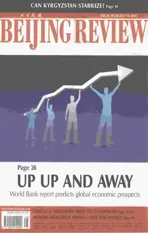CRISIS FOCUS Steps Toward Financial Viability
2010-09-12
CRISIS FOCUS Steps Toward Financial Viability

If the world learns one lesson from the fnancial crisis, it should be this: The global economy needs a more disciplined fnancial system. To accomplish this, more reforms should be carried out. The World Economic and Social Survey 2010, a recent report by the Department of Economic and Social Affairs of the United Nations, outlined this issue. Edited excerpts follow:
The fundamental weakness of the international fnancial system played a key role in the recent global economic crisis. Financial deregulation and lifting capital controls in most countries supported greater global financial integration during the 1990s and 2000s. It also caused financial innovations to shift toward new, complex derivatives and increased the distance of fnancial instruments from more tangible and productive assets.
In large part, this process of “financialization” expanded beyond the control of regulators. In addition to fostering an illusion of asset diversifcation, it promoted excessive risk-taking and asset inflation bubbles, which stimulated what proved to be an unsustainable pattern of global economic growth. Unregulated financial expansion also fed pro-cyclical capital flow volatility and speculation in commodity markets. The latter played some role in the fuel and food crises.
In today’s world of increased economic and political interdependence, achieving a broad-based, rapid and sustained growth in employment and income involves even more complex policy challenges than those of the past.
A number of options are available for creating a more stable financial system and a better environment for sustainable growth. Some are being addressed as part of the responses to the 2008-09 global crisis, but all will probably need to be adopted to bring about the desired outcome.
First, improved international fnancial regulation is needed to stem excessive risk-taking and capital flow volatility, including through appropriate capital controls and macro-prudential regulatory reforms.
Second, strengthening international tax coordination and lifting bank secrecy are needed for comprehensive financial regulatory and supervisory reforms to ensure that oversight extends to currently unregulated offshore banking centers now operating as tax havens.
Third, a new global reserve system should be created, one that no longer relies on the U.S. dollar as the single major reserve currency. The U.S. dollar has proven unstable, which is a requisite for a solid reserve currency. As such, a new system needs to be developed. That system should allow for better pooling of reserves at regional and international levels; it must not be based on a single currency or even multiple national currencies but instead should permit the diffusion of international liquidity (such as Special Drawing Rights) to create a more stable global financial system. Such diffusions could also underpin the fnancing of investment in long-term sustainable development.
None of these reforms will work effectively, however, if the democratic deficit undermining the credibility of major international fnancial institutions is not repaired. The governance structure of the IMF and the World Bank must be reformed to adequately reflect changes by major actors in the world economy, and to be more responsive to current and future challenges, thereby strengthening the legitimacy and effectiveness of these institutions. It is important not only to rebalance voting power in these institutions but to fundamentally restructure their functions and to equip them with the resources necessary to enable them to effectively safeguard global financial stability, coordinate macroeconomic policies and provide adequate long-term development fnancing.
